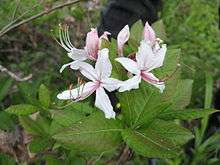Rhododendron periclymenoides
| Rhododendron periclymenoides | |
|---|---|
 | |
| Scientific classification | |
| Kingdom: | Plantae |
| (unranked): | Angiosperms |
| (unranked): | Eudicots |
| (unranked): | Asterids |
| Order: | Ericales |
| Family: | Ericaceae |
| Genus: | Rhododendron |
| Species: | R. periclymenoides |
| Binomial name | |
| Rhododendron periclymenoides Michx. | |
| Synonyms | |
|
Rhododendron nudiflorum | |
Rhododendron periclymenoides is a species of Rhododendron native to riparian and moist habitats, including swamps. It grows as a shrub and is a popular horticulture plant. Like many members of the genus, the plant contains toxins in all parts of the flower. It is deciduous. The common names for the plant are pink azalea[1] and pinxter flower. The flowers have showy pink petals and 2-inch (51 mm) long stamens; they do not carry a scent. The leaves of this shrub are bright green and shaped like a big basil leaf. The pinxter grows about 6 feet (1.8 m) tall. Rhododendron periclymenoides are often seen in wet places. They range anywhere from Alabama to New Hampshire.
Pinxter flowers grow wild down into north central Florida and can be seen starting to bloom usually in February in O'Leno State Park in Columbia County along the Santa Fe River.
References
- ↑ "Rhododendron periclymenoides". Natural Resources Conservation Service PLANTS Database. USDA. Retrieved 21 October 2015.
| Wikimedia Commons has media related to Rhododendron periclymenoides. |